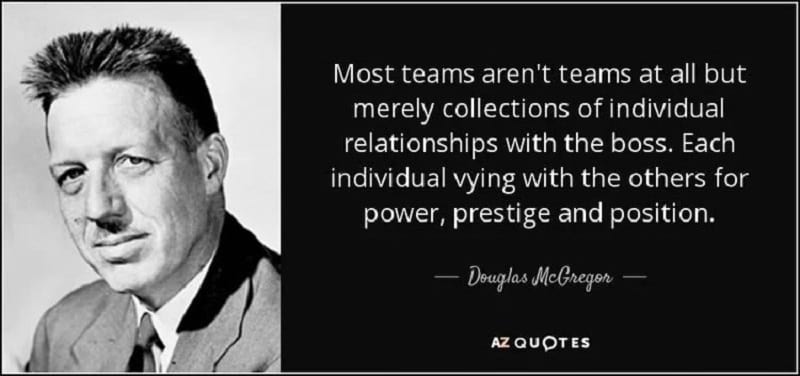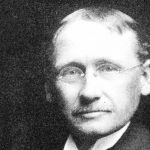Douglas McGregor biography, quotes and theory

Douglas McGregor (1906 –1964) was a famous management professor in the field of personal development and motivational theory. He is best known for his development of the Theory X and Theory Y, a leadership theory on two different leadership styles. This article contains a short biography, quotes and publications of Douglas McGregor.
Who is Douglas McGregor? His biography
Education
Douglas McGregor has earned his Bachelor (B.E.) in Mechanical Engineering at the Rangoon Institute of Technology (RIT) in Burma.
In 1932 he earned his Bachelor (B.A.) in Administration at the Wayne State University. Still he wasn’t finished on studying. He had a special interest in psychology and went to the Harvard University. First he earned his master (M.A.) in 1935 and in 1935 got his Ph.D. degree in social psychology.
After receiving his doctorate, McGregor stayed active in the academic world. He continued his academic career by lecturing at Harvard University and MIT Sloan School of Management.
The development of Theory X and Theory Y
He was very interested in scientific management and modern management, in particular the leadership styles and the influence and effects. This is where the first ideas were born on the Theory X and Theory Y.
Further study and empirical research resulted in one of his best-seller book: The Human Side of Enterprise (1960). The content of the book is about individual management assumptions, in relation to the human nature and the way a manager manages his or her employees.
During his career Douglas McGregor didn’t publish much. But when he published it had great impact, like Henri Fayol. Just before he died (suddenly because of a heart attack), he wrote articles about the new Theory Z.
This Theory Z was an answer on the critics of Theory X and Theory Y.
Together with William Ouchi, he developed Theory Z which is about promoting stable employment, high sense of productivity and high employee morale and -satisfaction.
Douglas McGregor quotes
- “The ingenuity of the average worker is sufficient to outwit any system of controls devised by management.”
- “An objective without a plan is a dream.”
- “Most teams aren’t teams at all but merely collections of individual relationships with the boss. Each individual vying with the others for power, prestige and position.”
- “Man is a wanting animal – as soon as one of his needs is satisfied, another appears in its place. This process is unending. It continues from birth to death.”
- “Trust means “I know that you will not-deliberately or accidentally, consciously or unconsciously-take unfair advantage of me.” It means “I can put my situation at the moment, my status and self-esteem in the group, our relationship, my job, my career, even my life in your hands with complete confidence.”
- “Relationships is a growing part of life; not life growing apart.”
- “Our goal should be minimum standardization of human behavior.”
- “Then it becomes necessary to get the field organization to accept the help provided. This is normally the role of the Change Manager; to implement the change that no-one asked for or wants.”
- “Management cannot provide a man with self-respect or with the respect of his fellows or with the satisfaction of needs for self-fulfilment. It can create conditions such that he is encouraged and enabled to seek such satisfactions for himself, or it can thwart him by failing to create those conditions.”
Books and publications
- 2006, 1979, 1960. The human side of enterprise. McGraw Hill Professional.
- 1976. An analysis of leadership. Leadership and social change, 16-24.
- 1972. An uneasy look at performance appraisal. Reprint Service, Harvard Business Review.
- 1969. Theory Y: The integration of individual and organizational goals. People and productivity, 194.
- 1967. The professional manager. McGraw Hill Professional.
- 1967. Do Management Control Systems Achieve Their Purpose?. Management Review, 56(2), 4-18.
- 1966. The human side of enterprise. Classics of Organization Theory, 179-183.
- 1961. New concepts of management. Technology Review.
- 1957. An uneasy look at performance appraisal. Soldiers Field.
- 1948. The staff function in human relations. Journal of Social Issues, 4(3), 5-22.
- 1947. Union-management cooperation: a psychological analysis. Mass. Inst. of Technology.
- 1944. Conditions of effective leadership in the industrial organization. Journal of Consulting Psychology, 8(2), 55.
- 1944. Getting effective leadership in the industrial organization. Massachusetts Institute of Technology, Department of Economics and Social Science.
- 1938. The major determinants of the prediction of social events. The Journal of Abnormal and Social Psychology, 33(2), 179.
- 1935. Scientific measurement and psychology. Psychological Review, 42(3), 246.
How to cite this article:
van Vliet, V. (2016). Douglas McGregor. Retrieved [insert date] from Toolshero: https://www.toolshero.com/toolsheroes/douglas-mcgregor/
Original publication date: 09/27/2016 | Last update: 11/29/2023
Add a link to this page on your website:
<a href=”https://www.toolshero.com/toolsheroes/douglas-mcgregor/”>Toolshero: Douglas McGregor</a>











